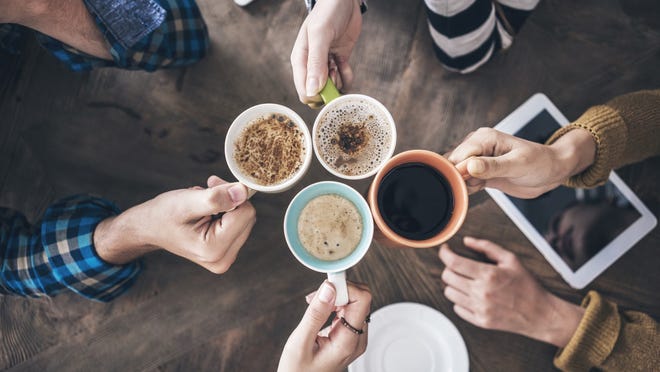Ah, coffee. The first thing you drink when you wake up, the beverage you rely on to cure your afternoon drowsiness and the solution to your all-nighter.
But what about all the common myths that we’ve heard when it comes to coffee? Does drinking it lead to long-term weight loss? Is it true that drinking coffee will shorten our lifespan? Is it really unhealthy? Are we getting extra caffeine if we opt for a darker roast at the coffee shop?
USA TODAY spoke to experts to help unravel some of the mysteries that lie behind one of the most popular beverages in the world.
Drinking coffee leads to weight loss
According to Katherine Zeratsky, a registered dietician at Mayo Clinic, caffeine is a stimulant that increases metabolism in the body. She says that caffeine alone, however, does not contribute to long-term weight loss as there are other factors to take into consideration, including healthy diet and exercise.
“Caffeine can increase your basal metabolic rate, but the basal metabolic rate has only a small percentage overall of what happens with how we burn calories,” Zeratsky told USA TODAY. “It is probably not going to be significant enough to see a change in weight that most people are looking for.”
Zeratsky adds that while research on the connection between caffeine and weight isn’t definite, there are a few theories on how caffeine might affect weight. One theory is that caffeine can suppress appetite and reduce feelings of hunger.
Ashley Shaw, a counseling dietician at Natus Wellness, says that appetite suppression from caffeine can depend on how often coffee is consumed between meals.
“If you were to drink coffee before you were to eat a meal, you would probably feel a little bit more full than you normally would if you drank a cup of water. You might not eat as much of your meal, and that is probably where you’re going to see that weight loss effect,” Shaw told USA TODAY.
Shaw adds that the way bodies react to coffee is personal.
“Coffee acts as a stimulant and an appetite suppressant for some, but it is individualized because some people might not have that effect.”
Coffee is unhealthy OR coffee is healthy
Edward Giovannuci, a professor of nutrition and epidemiology at the Harvard School of Public Health, says that in major reviews of studies, coffee has been associated with a probable decreased risk of some cancers and Type 2 diabetes.
“Coffee does have some unique compounds that are beneficial to health. These include some antioxidants and anti-inflammatory compounds,” Giovannuci told USA TODAY.
But, Giovannuci says the possible health benefits are not always there.
“Caffeine in pregnant women is associated with increased risk of pregnancy loss,” Giovannuci said.
He also says that there may be acute effects of too much caffeine in susceptible people in raising blood pressure and causing sleep disturbances.
“Yet, overall, coffee drinkers have a lower risk of cardiovascular disease. So as long as you don’t suffer these acute effects, you shouldn’t worry,” he said.
Is coffee healthy or not?:Here’s how much you should drink — and how much is too much
Liver cancer:Drinking 3 to 4 cups of coffee a day reduces risk, study suggests
The darker the roast, the stronger the caffeine
According to the National Coffee Association (NCA), roasting itself doesn’t change the amount of caffeine in coffee beans.
“Many people assume that the strong, rich flavor of darker roasts indicates a higher level of caffeine, but the truth is that light roasts could actually have a very slightly higher caffeine content,” an NCA representative told USA TODAY.
Coffee stunts your growth
Zeratsky says that coffee or caffeine itself does not directly stunt growth. Instead, if a child is consuming coffee, sodas or other beverages that are displacing the intake of beverages thought to be nutritious, then parents would have the concern of whether they are getting adequate nutrients to promote or meet their growth potential.
“It’s the idea that we don’t want caffeinated beverages to be replacing other foods and beverages that are nutritious that will promote appropriate growth, which is why caffeine is not recommended at all for children and teenagers,” Zeratsky said.
Coffee will shorten your lifespan
According to a 2018 JAMA internal medicine research study, researchers analyzed data from half a million Britons over a 10-year study period and found that drinking coffee, whether decaf or caffeinated, was inversely associated with lower risk of dying, including those who drink eight or more cups per day.
A 2019 Pubmed research study, after analyzing 21 cohort studies with over 10 million participants, found that drinking one cup of coffee, whether decaf or caffeinated, per day was associated with a 3% reduced risk of death, and drinking 3 cups of coffee was associated with a 13% reduced risk of death.
“Within an acceptable amount, coffee can be part of a healthy diet and, in fact for many people, coffee is a rich source of antioxidants. So when you think about healthy aging, having foods or beverages that have those antioxidants is thought to be helpful,” Zeratsky said.
With all of the coffee and wine studies,:how can you know which ones are worth your time?
Coffee will dehydrate you
Coffee does have fluids in it that can count toward one’s hydration needs, and it is good to take in moderate amounts. But, Shaw says that having too much can have a mild diuretic effect.
“Basically a diuretic just kind of causes you to go to the bathroom more, so you are having more fluid leave the body, so a balance of one or two cups should be fine,” Shaw said.
